- Home
- T. Kingfisher
Nine Goblins Page 2
Nine Goblins Read online
Page 2
And they were grateful, too—not a month went by when he didn’t wake up to see gigantic cloven hoofprints around the yard, and half a billy-goat left draped across a tree stump.
Not like unicorns. As soon as the foal was able to walk, the mare would be gone like a shot, and he’d never see her again.
Come to think of it, maybe that wasn’t a bad thing.
“Okay,” he said to the unicorn, mildly surprised at the weariness in his own voice, “I think I’ve got it presenting right. Let’s give this a try…PUSH!”
The mare pushed. He pulled. There was a brief horrible moment where nothing happened and Sings-to-Trees saw another two hours of internal fumbling ahead of him, and then with almost absurd ease, the foal slid out and hit him in the chest, the mare grunted in triumph, and he fell over backwards with his arms full of slimy baby unicorn.
Its first act was to kick him with its adorable little hooves. He gazed at the barn rafters while it beat a tattoo on his ribs. It hurt, but not as much as his knees did.
Okay. Not much more to go. He could handle this.
He staggered upright, shuffled on his knees to the end of the unicorn he hadn’t seen much of this evening, and dumped the foal in front of her.
She bent down, snuffled at the tiny creature, tapped it delicately with her foot-long horn as if to test it, and then began licking at its damp white hide. The bedraggled foal lifted its muzzle and made a faint squeaky snort of protest.
Even to someone who didn’t much care for unicorns, at another time, this scene would be pure magic, a reaffirmation of everything good and noble in the world. But there was gunk from the hind end of a unicorn plastered clear up the side of his face, delicate hoof prints turning purple across his ribcage, and he felt about a thousand years old.
He got painfully to his feet—his knees had moved through the on-fire stage and now felt as if tiny wolverines were chewing under the kneecaps—and staggered outside to the pump. He tried to grab the pump handle, and for an awful minute his hand wouldn’t close on it.
Well, no surprise there. His right arm, which had been the one inside the unicorn, was red and white and bruising magnificently where contractions had smacked his bicep repeatedly against the mare’s pelvic bones, and there was unicorn crap and amniotic fluid and bits of straw all over him.
Sings-to-Trees slumped against the pump handle, moaned, and managed to grab it with his left hand. By dropping most of his weight on it, with all the grace of a sack of potatoes, he got enough water out to sluice the worst of the muck from him. It was icy cold, but he didn’t really care.
There was soap somewhere. He found it. It didn’t lather very well, but he made at least a symbolic effort before giving up.
He ducked his head back in the barn and glanced over at the mother and child, who were arranged in a beautifully domestic scene, as tranquil as the dawn. White hide glowed in the muted lamplight of the barn. You’d never know she’d spent hours in labor. That was unicorns for you.
Pausing only to make sure that the afterbirth had passed with no difficulties—he considered patting the foal, but the mare, ingrate that she was, stamped a hoof at him and lowered her horn warningly—Sings-to-Trees limped out of the barn.
The moon glared down like a bar of soap in a bucket of cold sky. The path up to the house was packed earth, washed blue and black in the moonlight, and approximately a thousand miles long. Several ages of the earth passed while he toiled up to the house, punctuated by the bright jangle of pain from his knees.
A coyote with one eye and a ragged ear was stretched out across the porch rug. When the elf was close enough, it lifted its head, pricked up the good ear, and came down to meet him. A cold nose touched his hand, and the tail made a careless motion that was certainly not a wag—Fleabane had a certain amount of dignity, despite his name—but might conceivably be mistaken for one. Sings-to-Trees wound a cold hand in the coarse hair behind the coyote’s ears and rubbed affectionately. They walked the last few yards up to the house together, and then Fleabane flopped back down on the rug and Sings-to-Trees went inside.
There were animals to be fed yet—a bat hanging upside down in the closet who was thankfully past needing ground mealworms shoved down its throat, an orphaned raccoon who was just starting on solid foods and needed warm milk with a little bread, and of course the gargoyle. He dumped a handful of dried mealworms on the closet floor, heard a grumpy chitter in response, and left the bat to its own devices.
There was cold chicken left, and he divided it up carefully, a quarter for a sandwich, and three quarters for the gargoyle. He built up the fire, and set milk to warm by the hearth. The warmth was wonderful, if painful on his cold hands. He started to sink down into the rug in front of the fireplace, caught himself, and lurched to his feet. He didn’t dare stop moving. If he sat down to rest, he wasn’t going to get back up in a hurry.
The back door opened with a wooden groan. He took three steps forward, turned and hucked the battered remains of the chicken onto the roof.
A stony chuckling came down to him, followed by the crunch of chicken bones. Satisfied, Sings-to-Trees went back inside to feed the raccoon.
He must have made tea at some point, because when he woke up, there was a stone cold mug of it next to his elbow and a half-eaten sandwich sliding off his knee. The raccoon cub was asleep on his lap, in the wreckage of what had been a saucer full of bread soaked in warm milk. Perhaps it was just as well he hadn’t bothered with a shirt.
It looked like most of the milk had gone into the raccoon, anyway, and his sandwich had a distinctly gnawed look. Some days that was all you could ask for.
Sings-to-Trees gave up even pretending he was awake. He put the raccoon to bed, toweled off the remnants of both their dinners as best he could, and limped to the bedroom. He had just enough energy to remove his shoes, and then sleep crept up and hit him.
FOUR
The Nineteenth Infantry were marching, if you could call it that.
Goblins march badly. They have enormous thick feet like elephants, so they are quite good at walking, but they have no rhythm, and very few goblins have ever mastered the ability to tell left from right without stopping to think about it. So when somebody yells “Left foot, right foot!” there is generally a long silence while the goblins all try to remember which is which.
At some point, one bold goblin will step out, and all the others follow immediately in the hope he knows what he’s doing. It’s about a fifty-fifty shot if he’s leading with the correct foot or not, but at least they’re all wrong together.
On a good day, they will stay in step for nearly a minute before somebody gets bored, or trips, or stumbles, or forgets what he’s doing and begins skipping. Small knots break off. Officers ride around on their pigs, shouting orders and leaving havoc in their wake.
Eventually the better sergeants round up their units and herd them more or less in the direction that everybody seems to be going. In fits and starts, the goblin army lurches on.
Nessilka was a fairly good sergeant, and had most of the Whinin’ Niners aimed in the correct direction. Algol and the pack mule formed the nucleus of the group, and since he was taller than most of the other goblins, everybody was able to keep him in sight.
At the moment, Nessilka’s greater concern was the two new recruits.
They were identical twins, which gave her a headache, and they were young and bright-eyed and enthusiastic and finished each other’s sentences, which took the headache to a whole new level.
“Where are we…”
“…going, Sarge?”
“We don’t know. We just follow orders and go there.”
They gave her identical nods.
“Will we be…”
“…fighting, Sarge?”
“Sooner or later, yes.”
Everyone stumped along in silence for a while. The flat stony badlands were giving way to little lumpy hills and the occasional scrubby tree, with more trees on the horizon. The wind that
came to them smelled like pine, which was a big improvement over goblin.
The new recruits had the standard loincloth from home, made out of the standard rancid goathide, and they both had what passed for weaponry in the goblin army—a board with a nail in it. Unless she managed to beat some kind of sense into them, Nessilka gave them a week.
“So you’re twins,” she said, by way of an opening gambit.
“Yes, Sarge!” they said in unison.
“How should I tell you apart?”
“You…”
“…don’t.”
“Not even our mom…”
“…can tell us apart.”
“We’ll fix that,” she said grimly, and beckoned to Thumper.
Thumper would need thick-soled boots to stand four feet tall, but he was at least four feet wide. His biceps were the size of badgers and he had no neck. He did not use a shield, preferring to carry two large spiked maces, both taken from the fallen foe. When he was hitting things, there was a joyful gleam in his eye, and when he wasn’t, there was a glitter that indicated he was probably thinking about hitting things.
He had no personality that Nessilka had ever been able to uncover—possibly it had gone off with his neck somewhere—but he was an excellent goblin to have at your side in a fight.
“Recruits, this is Thumper.”
“Hi, Thumper!” chorused the twins.
Thumper treated this the way he treated everything that did not involve hitting things—he eyed it warily to see if there was any potential hitting to be had, and then ignored it.
“Thumper,” she said, “I can’t tell these two apart.”
Thumper nodded.
“Fix that,” she said.
He nodded again, turned around, and punched the one on the left in the face.
The recruit fell over. The other recruit gaped at him.
Thumper picked the damaged recruit up, nodded to the sergeant, and wandered off.
The unfortunate goblin swayed on his feet. His left eye was already swelling, and would shortly be turning a striking shade of purple.
“That’s better,” said Nessilka. “Now, then. The first thing you should learn is to never tell a superior officer what they can’t do.”
They looked at her with identical miserable expressions (except for the swollen eye). “We’re sorry, Sarge.”
“Yeah, well…” Nessilka squelched a nagging feeling of guilt. It was a hard world and a hard war, and the sooner they learned it, the better. “What are your names?”
“Mishkin,” said the one on the right.
“Mushkin,” said the one with the swollen eye.
“Right. The next thing you should learn is how to take a punch a little better than that, but it’ll have to wait until we stop for the night. Have you had any training at all?”
“We had two weeks…”
“…of boot camp, Sarge.”
The sergeant grunted. “Whacked a lot of straw men with your board, eh?”
Mishkin nodded vigorously. Mushkin nodded rather more gingerly, holding his face.
Up ahead, Weatherby was drifting off to the side. Nessilka could tell he was planning to make a break for it, because he was starting to mutter to himself and tug at his clothes. She sighed, and did what sergeants have done since time immemorial…she delegated.
“Go see Corporal Algol and tell him that you’ve had the basic boot camp and nothing else. And that I said to put something on that eye.”
“Yes, Sarge!”
The twins went to find Algol, and Nessilka went to collar Weatherby.
Sings-to-Trees’ morning began slightly after dawn, when the hen crowed.
She was a black hen with a fine gold eye and a blue sheen to her feathers. She laid quite large brown eggs. She also mounted the other hens occasionally, an exercise in bafflement for everyone involved. And every morning, she crowed.
As far as he could tell, she seemed happy, so he’d resigned himself to getting up at hen’s-crow most mornings. He hadn’t wanted a rooster, anyway. His farm was located on the edge of what were nominally the Elvenlands. A small human settlement lay less than an hour’s walk away, where woods gave way to farmland. The humans viewed him as falling somewhere between the priest and the village idiot, and thus required feeding either way. Depending on the time of year, gifts of flour or cheese or bacon were always turning up, and they dumped excess chicks on him year-round. He had a hard enough time keeping up with donated chickens—had his small flock been producing more on their own, he’d have been hip-deep in fowl. So he was somewhat grateful for the confused hen, after all.
This morning, there was a small, fresh, cheese on the doorstep, accompanied by a small jug of buttermilk. He took both inside. Fleabane was gone, on some coyote-ish errand of his own, or there would have been toothmarks in the cheese.
Elf and raccoon shared a pleasant breakfast. It was a little over a month old—the raccoon, not the breakfast—with big, wide eyes and delicate, dexterous black fingers, and it was shortly going to be tearing his house apart. The destructive capacity of small cute animals was really quite astonishing. Fortunately, after years of this sort of thing, Sings no longer had much that could be torn apart. His furniture was heavy wood, scarred by claws and chewed by tiny (and occasionally not so tiny) teeth, the cushions faded by hundreds of washings, the rugs ragged and warm and mostly colorless.
He owned quite a few rugs. He had to wash them so often that it made sense to keep extras. An elven visitor had once commented (with the air of one desperately trying to find something complimentary to say) about the unusual patterns dyed into the rug. Sings-to-Trees had to explain that it wasn’t dyed, precisely, but marked by numerous Mystery Stains from patients who had not been entirely in control of their bladders. The silence had been awkward.
He suspected the other elf had been expecting something on the order of a hermit monk, communing with nature and binding up the wings of snow-white doves with snow-white bandages, not a bedraggled lunatic daubed with unspeakable substances, surrounded by shrieking birds, and massaging the belly of a tiny lynx kitten to make it defecate. (In Sings-to-Trees’ defense, it had been a particularly insane week, with two lynx kittens, a nestful of orphaned gray jays, an infant false-phoenix that kept exploding into flames when startled, and a pine marten with a broken foot, who would have happily eaten any of the other patients if he could catch them.) The other elf hadn’t been back.
The raccoon trundled away from its food, stood up briefly on its hind legs, wobbled, and tried to steady itself against his mug. The mug went over. The raccoon also went over. He could only catch one, and of course, there was no question.
The raccoon snuggled against his chest and went “Clur-r-r-p!” The mug went “plunk!” The buttermilk went into his lap.
“Bad raccoon.”
“Clurr-up!”
Well, it was his own fault for trying to feed himself and the creatures at the same time. The raccoon cub went back into its hutch by the hearth. He toweled off the worst of the buttermilk, and then the remains of the raccoon’s breakfast. The mug had survived intact.
Had he been inclined to collect blown glass sculptures, he would have lived a life of great frustration, but his tastes had been limited by necessity to things that could take a heavy pounding. The mug, for example, was attractively glazed earthenware—pretty enough, but durable, and easily replaced if, say, a raccoon got into a cupboard, had the door swing shut behind it, and tried to smash its way out.
Unfortunately, this meant that there was very little elven about his home, as durability went somewhat against the prevailing elven aesthetic of things brought briefly from the earth, and then given back. A litter of fox cubs could give things back to the earth at an extraordinary rate, generally before the owner was quite done with them. Sings resigned himself to art made by humans and occasionally dwarves. As sacrifices went, he’d made worse.
Speaking of sacrifices…
He dumped the mug in the washbas
in, shoved his feet into boots, squared his shoulders, and went to see if the unicorn was still there.
FIVE
“Two weeks of boot camp, eh?” said Algol. He was digging in the pack goat’s packs until he came up with a dubious bit of steak left over from the elephant (or possibly Blockhammer). “Here, put this on your eye.”
The steak was cold, thanks to Murray. He had invented a device that kept meat cold, a small box with a fan and little metal wings. He claimed the wings dispersed heat. Most of the other goblins thought he was loony, but Algol had made an effort to understand. “Like birds!” he’d said.
Murray had stared at him, wiping sweat from under his goggles.
“Hot air rises,” Algol tried to explain, “so birds must be hot, because they fly. The wings cool them down so they can land without floating away.”
“Riiiiight,” Murray had said. “Ah…yeah. Just like that. How…novel of you to figure that out.”
Algol was proud.
Mushkin put the steak on his eye. Mishkin hovered nervously. “Will he be okay? Should he go to the medics?”
“You in a big hurry to lose the eye?” asked Algol mildly. “Keep the steak on it, you’ll be fine.” He had figured out that the best way to deal with the twins was to address them as one goblin with four arms and two heads.
“This is Buttercup.” Algol nodded to the supply goat.
“Hi, Buttercup!” the twins chorused.
Up ahead, Sergeant Nessilka cringed. Why had she let him name the goat? You shouldn’t name the goat. It was just “the goat.” If food got scarce enough, you ate the goat, and that was much harder when it had a name.
Algol was a good goblin, and a fairly reliable corporal, but he had some odd blind spots, often where animals were involved.

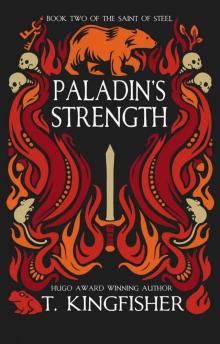 Paladin's Strength
Paladin's Strength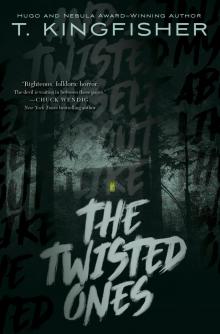 The Twisted Ones
The Twisted Ones The Hollow Places
The Hollow Places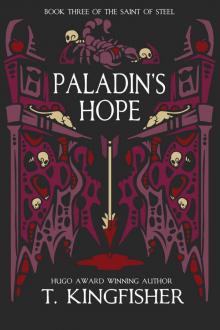 Paladin’s Hope: Book Three of the Saint of Steel
Paladin’s Hope: Book Three of the Saint of Steel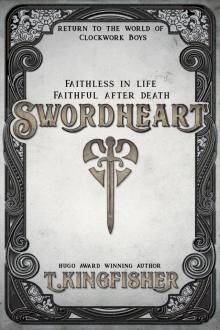 Swordheart
Swordheart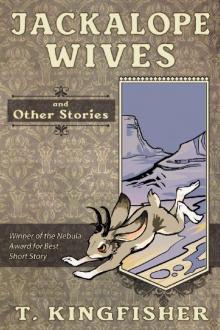 Jackalope Wives And Other Stories
Jackalope Wives And Other Stories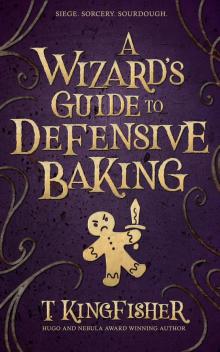 A Wizard's Guide to Defensive Baking
A Wizard's Guide to Defensive Baking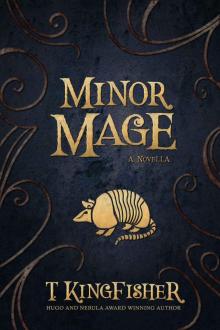 Minor Mage
Minor Mage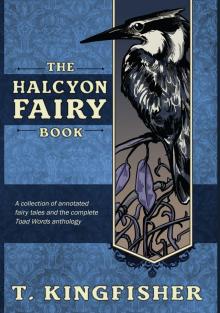 The Halcyon Fairy Book
The Halcyon Fairy Book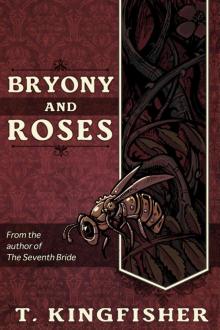 Bryony and Roses
Bryony and Roses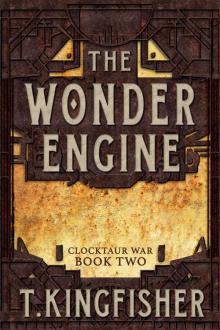 The Wonder Engine_Book Two of the Clocktaur War
The Wonder Engine_Book Two of the Clocktaur War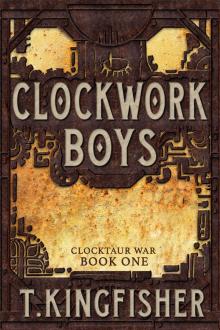 Clockwork Boys: Book One of the Clocktaur War
Clockwork Boys: Book One of the Clocktaur War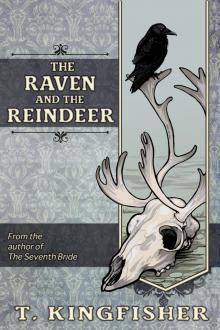 The Raven and the Reindeer
The Raven and the Reindeer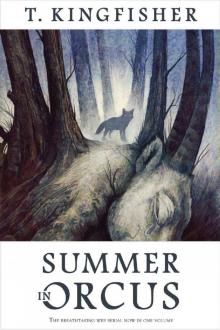 Summer in Orcus
Summer in Orcus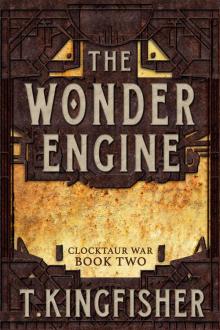 The Wonder Engine
The Wonder Engine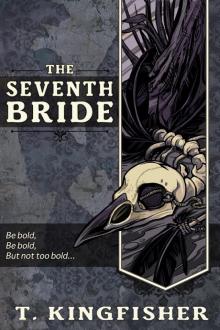 Seventh Bride
Seventh Bride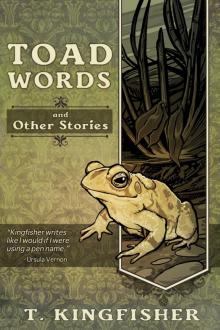 Toad Words
Toad Words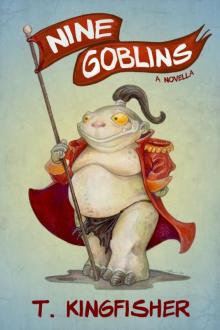 Nine Goblins
Nine Goblins